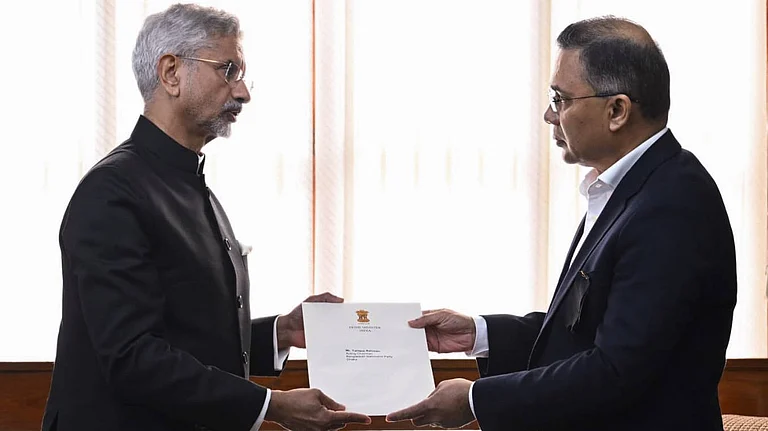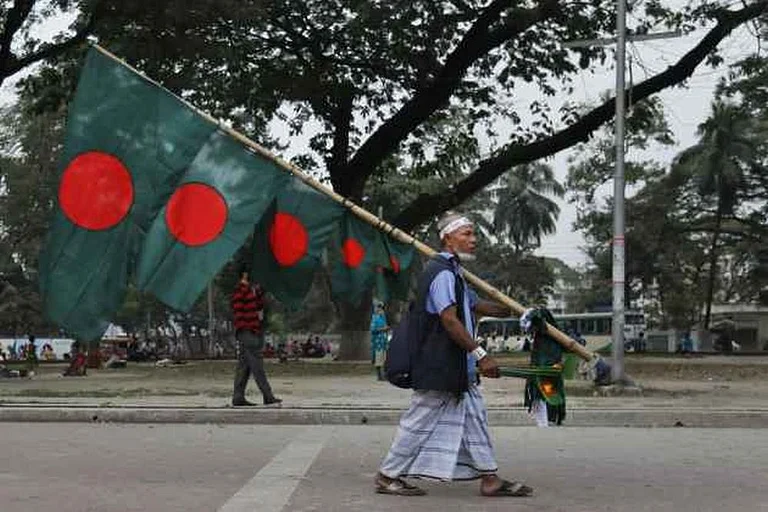Head of Bangladesh's interim government Muhammad Yunus said former prime minister Sheikh Hasina, who fled the country on August 5 amid unrest, will have to keep quiet during her time in India and termed her political remarks from the Indian territory an "unfriendly gesture".
In an interview with news agency PTI at his official residence in Dhaka, Yunus said that while Bangladesh values strong ties with India, the latter must move “beyond the narrative that portrays every other political party except Awami League as Islamist and that the country will turn into Afghanistan without Sheikh Hasina.”
'Had She Been Quiet...'
Muhammad Yunus was appointed the country's Chief Advisor after Hasina's ouster, which led to the formation of an interim government announced by Bangladesh Army Chief General Waqar-uz-Zaman.
"If India wants to keep her until the time Bangladesh [government] wants her back, the condition would be that she has to keep quiet," 2006 Nobel Peace Prize laureate Yunus said in the interview".
"No one is comfortable with her stance there in India because we want her back to try her. She is there in India and at times she is talking, which is problematic. Had she been quiet, we would have forgotten it; people would have also forgotten it as she would have been in her own world. But sitting in India, she is speaking and giving instructions. No one likes it,” he said.
Yunus appeared to be referring to Hasina's statement on August 13 in which she demanded "justice", saying those involved in recent "terror acts", killings and vandalism must be investigated, identified and punished.
“It is not good for us or for India. There is discomfort regarding it,” Yunus told in the interview.
What Led To Hasina Landing In India
On August 5, the rule of Sheikh Hasina, the 76-year-old daughter of Bangladesh founder Sheikh Mujibur Rahman, came to an end after 15 years as she fled to an "undisclosed" location in a Bangladesh Air Force chopper after resigning as the prime minister amid deadly protests over a government job quota in the country.
The undisclosed location where Hasina landed turned out to be the Hindon Air Base in Uttar Pradesh's Ghaziabad, near the Indian capital city of Delhi. While her exact location still remains undisclosed, India has acknowledged her presence. External Affairs Minister of India S Jaishankar last month said in Parliament that Sheikh Hasina made a request for refuge in India at a short notice on Monday.
Hasina was elected for a record fourth consecutive term and fifth overall term in the 12th general election held in January, amid a boycott by the main opposition party Bangladesh Nationalist Party (BNP) of former premier Khaleda Zia and its allies.
Prime Minister Narendra Modi, in his Independence Day address from the ramparts of the Red Fort on August 15, expressed hope that the situation in violence-hit Bangladesh would return to normal soon and stated that 1.4 billion Indians are concerned about the safety of Hindus and minorities in the neighbouring country.
A month after the student-led movement ousted Bangladesh's prime minister Sheikh Hasina, the death toll in weeks of protests and clashes stands at over 600, which includes many people liked to or belonging to Hasina-led Awami League party.
The protests began in early July on a peaceful note with university students demanding to abolish quotas in civil service jobs, a third of which are reserved for relatives of veterans from Bangladesh’s war for independence from Pakistan in 1971. Those criticising the quota had argued the system was discriminatory and needed to be overhauled. while their request was largely met, the protests soon transformed into a wider anti-government movement.
Hasina, now in self-imposed exile in India, faces murder charges in more than 100 cases. Many cases have also been registered against those associated with Hasina, her party or her government - from former ministers and judges to journalists and even prominent cricket player Shakib Al Hasan.
Some schools and universities have since reopened, including Dhaka University, which became the epicenter for the protests against Hasina. Things are not back to completely back to normal yet as many heads of educational institutions have been forced to resign and in some cases, even though classes have formally restarted, few students are attending them, according to an Associated Press report.


























